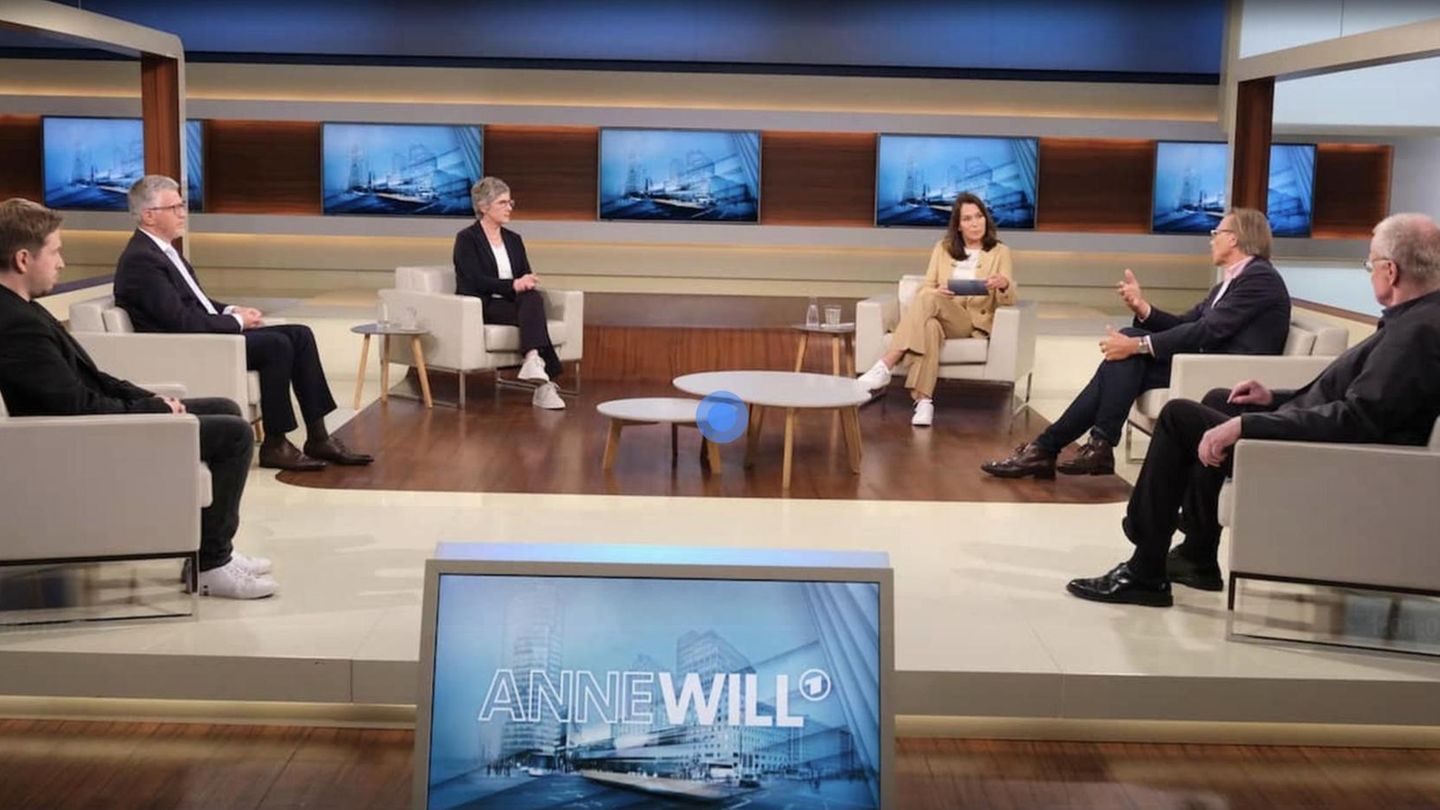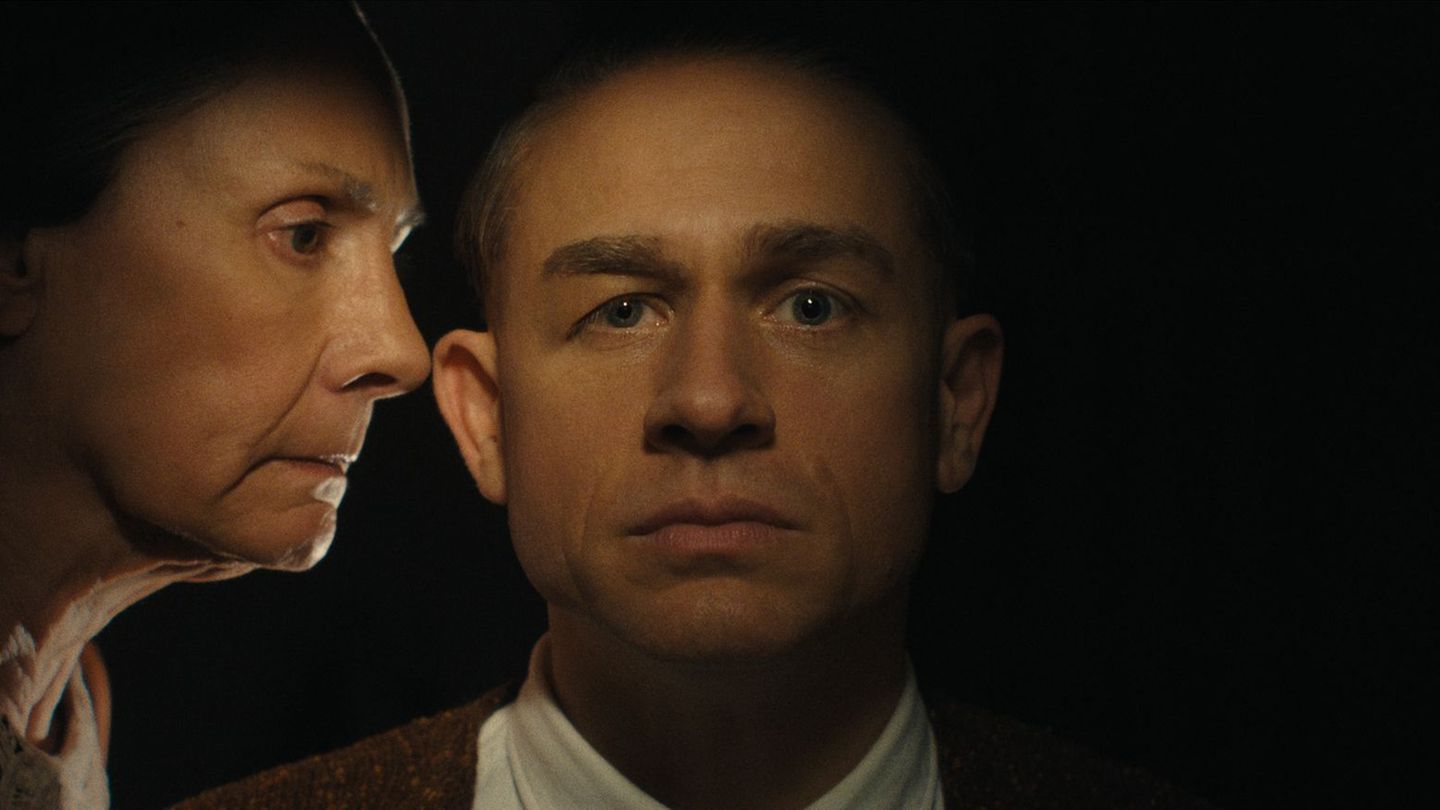TV debate
Between “arrogance”, “extermination” and “moral neglect”: Anne Will debates with letter writers about heavy weapons for Ukraine. The debate escalated mainly verbally.
By Jan Zier
Schleswig-Holstein is also on the edge of Anne Will’s own universe, which is why the state did not get its own program even after a state election with landslide victories and defeats. But there is also war in the Ukraine, and today, Monday, the victory over Nazi Germany is being celebrated in Russia. In addition, many people in this country are writing and signing open letters these days. And then there is Chancellor Olaf Scholz, who gave an unctuous speech to the nation on the day of liberation from Nazi rule. So let’s talk about war and peace once more: “More weapons for Ukraine – is that the way to peace?”
“Anne Will”: Who discussed?
Kevin Kuehnert (SPD), General Secretary
Britta Hasselmann (Bündnis 90/Die Grünen), parliamentary group leader
Rupert Polenz (CDU), President of the German Society for Eastern European Studies
Andriy Yaroslavovich MelnykAmbassador of Ukraine in the Federal Republic of Germany
Harold Welzersociologist, social psychologist and publicist
How did the discussion go?
Anne Will has kindly invited the more intelligent and serious among the current letter authors. So the sociologist Harald Welzer instead of Martin Walser or even Alice Schwarzer as the voice of those who now do not want to deliver heavy weapons to Ukraine. And the clever CDU foreign politician Ruprecht Polenz instead of the old Green Ralf Fücks as the voice of those who are in favor of “maximally weakening” Putin’s war capability and relying on the logic of deterrence. “It’s about Putin not being allowed to win this war,” says Polenz, because he wants to “wipe out” Ukraine. And there it is, the escalation: Because then comes Andriy Melnyk, a diplomatic diplomat in Ukraine who is just as omnipresent as he is polemical, and demands that “heaven and earth be moved to help us.” Yes, Germany should “do everything”. Nobody wants that here, and certainly not Scholz. And now?
But Harald Welzer, who wants to take the voice of the admonisher, isn’t convincing at first: “A war against a nuclear power cannot be won in the traditional sense,” he claims. And has to be reproached by Polenz: “That is empirically wrong”. It only has to refer to Vietnam or Afghanistan.
Welzer fears “an escalation of violence” and “a situation that is getting completely out of control”. One in which ever more and ever larger weapons are demanded and delivered. Permanent rearmament has no logical end and inevitably leads to “continuous war,” he believes. Welzer demands “a much more intensive search for negotiated solutions”. He wants to find ways to talk about a compromise.
It’s just that Vladimir Putin doesn’t want to talk seriously right now. And Welzer doesn’t have much concrete to counter this objection either. So: What those negotiated solutions are supposed to look like at the moment remains a mystery. “There isn’t just one solution,” he says. But which? He doesn’t say that. The leader of the Greens, Britta Haßelmann, even finds Welzer’s idea of a compromise “presumptuous”: “What kind of compromise is that supposed to be?” she asks, aghast, and it’s one of her more notable statements that evening. A compromise that you make with an aggressor like Putin? Hm. But it is also unclear what ultimately follows from this uncompromising approach. Polenz fears that the search for such negotiated solutions will escalate, because it could encourage Putin to expand his empire elsewhere and attack neighboring countries. “Not Russia, but Putin’s rule is threatened,” says the CDU politician – namely by advancing democracy.

“The silence of the guns alone does not bring peace,” says Kevin Kühnert, who has the thankless task of praising Scholz’s speech, which is generally felt to be somewhat meaningless in the group, as well-founded, to explain and convey his chancellor. Melnyk’s world is much simpler there: “People die in Ukraine every day,” he explains – and he also knows why: “That’s your responsibility,” says the diplomat, meaning all those who argue like Harald Welzer.
The special moment
When Melnyk, in his boisterous way, dismisses Harald Welzer as “morally neglected” as someone who “sits in his professor’s room and philosophizes” (and even Ms. Will intervenes at this point), the sociologist starts a long lecture as punishment, in which he wants to lecture about the war experiences of the Germans in general and in particular. “I’m not your student,” Melyk says, without waiting for an end. “That’s just narrow-minded,” complains Welzer, with a derogatory hand movement.
The findings
According to a representative survey, 45 percent of Germans are in favor of the delivery of heavy weapons to Ukraine, but 55 percent are against it.
Conclusion
The dilemma is clear, but this evening does not bring any new insights. But the debate escalated mainly verbally.
Source: Stern
David William is a talented author who has made a name for himself in the world of writing. He is a professional author who writes on a wide range of topics, from general interest to opinion news. David is currently working as a writer at 24 hours worlds where he brings his unique perspective and in-depth research to his articles, making them both informative and engaging.




